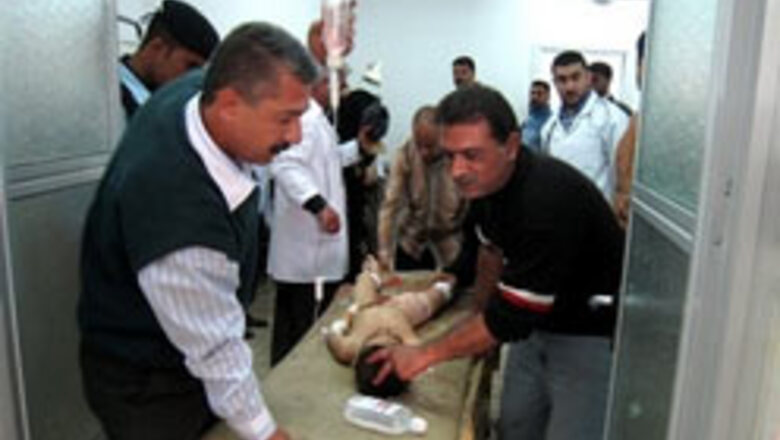
views
Baghdad: Two truck bombs simultaneously struck markets in Tal Afar and a suicide car bomber exploded his payload near Ramadi on Tuesday, the latest attacks in a surge of violence outside the Iraqi capital.
The three bombings killed at least 40 people, including 30 in Tal Afar.
Baghdad saw violence as well Tuesday, as a mortar attack in the Sunni-dominated Dora neighborhood killed two children, a woman, and a man in the second deadly mortar attack on the enclave in three days.
Police also opened fire on a suicide car bomber as he drove toward a checkpoint near a cemetery in the center of the capital, but he was able to detonate his explosives killing one policeman and seriously wounding three other people, police said.
The attacks in Tal Afar, the second in four days, occurred about 4:00 pm at popular markets in the northern and central parts of the city, 260 miles northwest of Baghdad.
At least 30 people were killed and 50 wounded, city and police officials said.
On Saturday, a man wearing an explosives belt blew himself up outside a pastry shop in the central market area in Tal Afar, killing at least 10 people and wounding three.
Tal Afar, about 90 miles east of the Syrian border, has suffered frequent insurgent attacks despite a March 20, 2006, declaration by President Bush that the city was an example of
Iraq's improving security.
Among the largest attacks were a suicide car bombing on Oct. 7, 2006, that targeted a police checkpoint and killed 14 people, and a September 18, 2006, suicide bombing that killed 20 and wounded 17.
A car bomb also obliterated a tent crowded with mourners for the funeral of a Kurdish official on May 1, 2005, killing 25 people, and 30 were killed when a suicide attacker set off explosives hidden beneath his clothing outside an army recruiting center on October 11, 2005.
Tal Afar was an insurgent stronghold until US and Iraqi troops drove them out in a September 2006 operation and constructed huge sand barriers around the city to limit access.
Bush cited that operation, in which insurgents melted away into the countryside rather than fight, as an example that gave him "confidence in our strategy."
The explosions in Tal Afar and Ramadi and an eruption of sectarian clashes south of Baghdad underscored concerns that militants have fled the capital in response to a US-led security crackdown, bringing violence with them to the hinterlands.
PAGE_BREAK
The suicide car bomber near Ramadi struck a district northeast of the provincial capital that was not patrolled by the military, police Col Tarik Yousif said.
The US military said a Marine was killed on Saturday during combat in Anbar province west of Baghdad but gave no details.
Separately, Kirkuk police 1st Lt Marewan Salih said two elderly Chaldean Catholic nuns were stabbed multiple times by intruders who raided their home Monday night near Kirkuk's Cathedral of the Virgin in Kirkuk. They lived alone and there was no sign of a robbery, Salih said.
Margaret Naoum, 79, was stabbed seven times as she stood in the garden just outside the sisters' home.
The attackers then found Fawzeiyah Naoum, 85, lying on the sofa inside, recovering from eye surgery last week. She was stabbed three times.
Chaldean Catholics are an ancient Eastern rite now united with Roman Catholicism. Adherents live mainly in Syria, Turkey, Iran and Iraq and most speak a dialect of Turkish.
In politics, a plan by Prime Minister Nouri al-Maliki and President Jalal Talabani to introduce legislation to allow former members of Saddam Hussein's ruling party — including those in the feared security and paramilitary forces — resume jobs in the government or receive pensions met with criticism.
The commission currently carrying out the government's so-called "de-Baathfication" policy said the draft law ignored victims of the former regime in a highly critical statement, indicating the draft law could face trouble in parliament.
"This draft turns a blind eye to the feelings of millions of the victims of Baath Party and pays no heed to their emotions and rights. This will not lead to reconciliation," the statement said.
Long demanded by the US to appease Iraq's once-dominant Sunni Arab minority, the measure would set a three-month challenge period after which ex-Baath party loyalists would be immune from legal punishment for their actions during Saddam's reign.
The draft law, which excludes former regime members already charged with or sought for crimes, also would grant state pensions to many Baathists, even if they were denied posts in the government or military.
The reconciliation measure is seen as an effort to short-circuit expected criticism of Iraq's government at an Arab League summit this week.
Al-Maliki is said to fear rising support among US-allied Egypt, Saudi Arabia and Jordan for an Iraqi national unity government led by former Prime Minister Ayad Allawi, a favorite of Washington.
On Monday, outgoing US Ambassador Zalmay Khalilzad expressed cautious optimism about Iraq's progress but warned that Americans were growing impatient with the war.
He also said Americans are in ongoing talks with insurgent representatives to try to persuade them to turn against al-Qaida.
"In my view, though difficult challenges lie ahead and there is a long way to go, Iraq is fundamentally headed in the right direction and success is possible," he said.




















Comments
0 comment